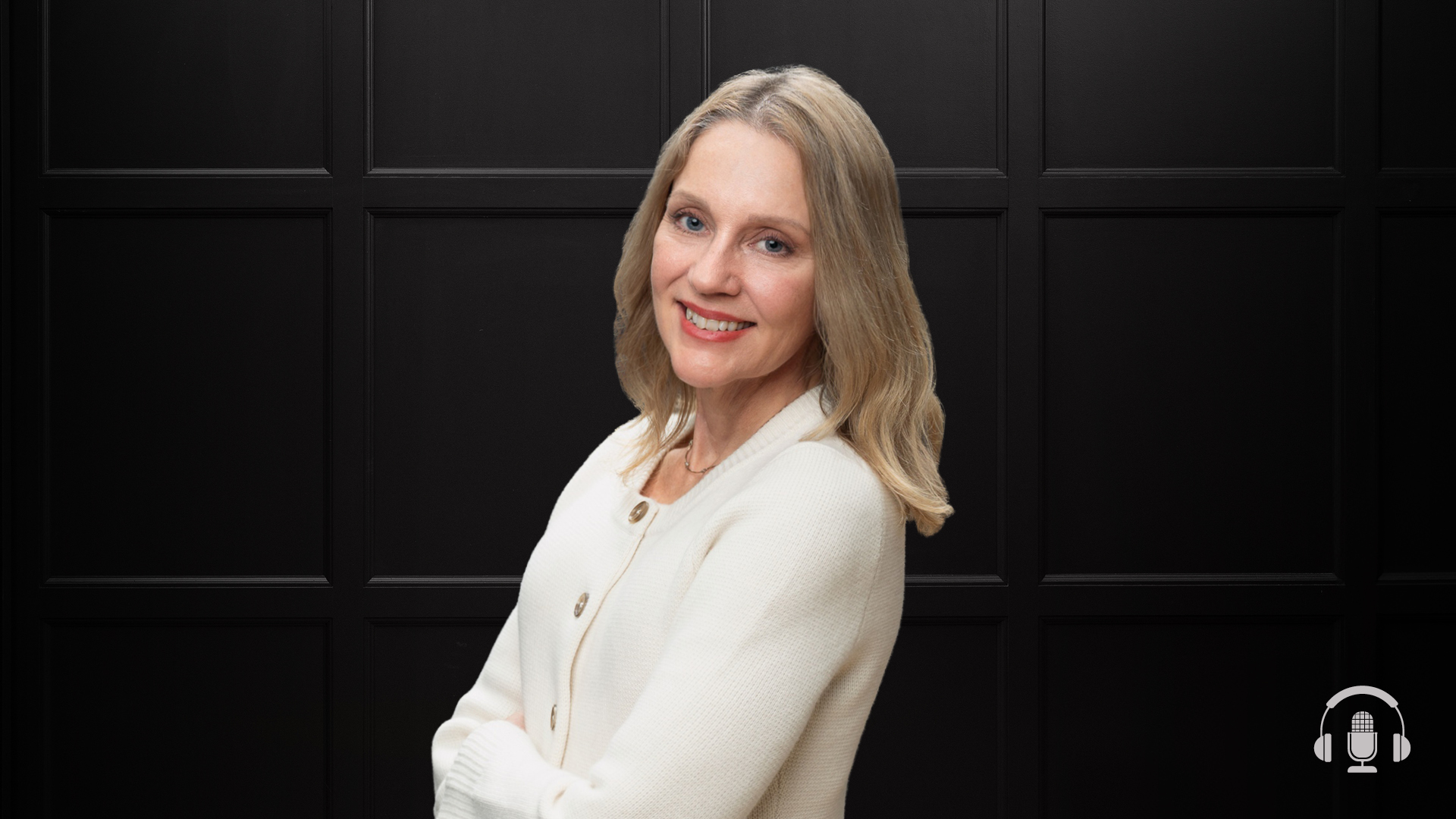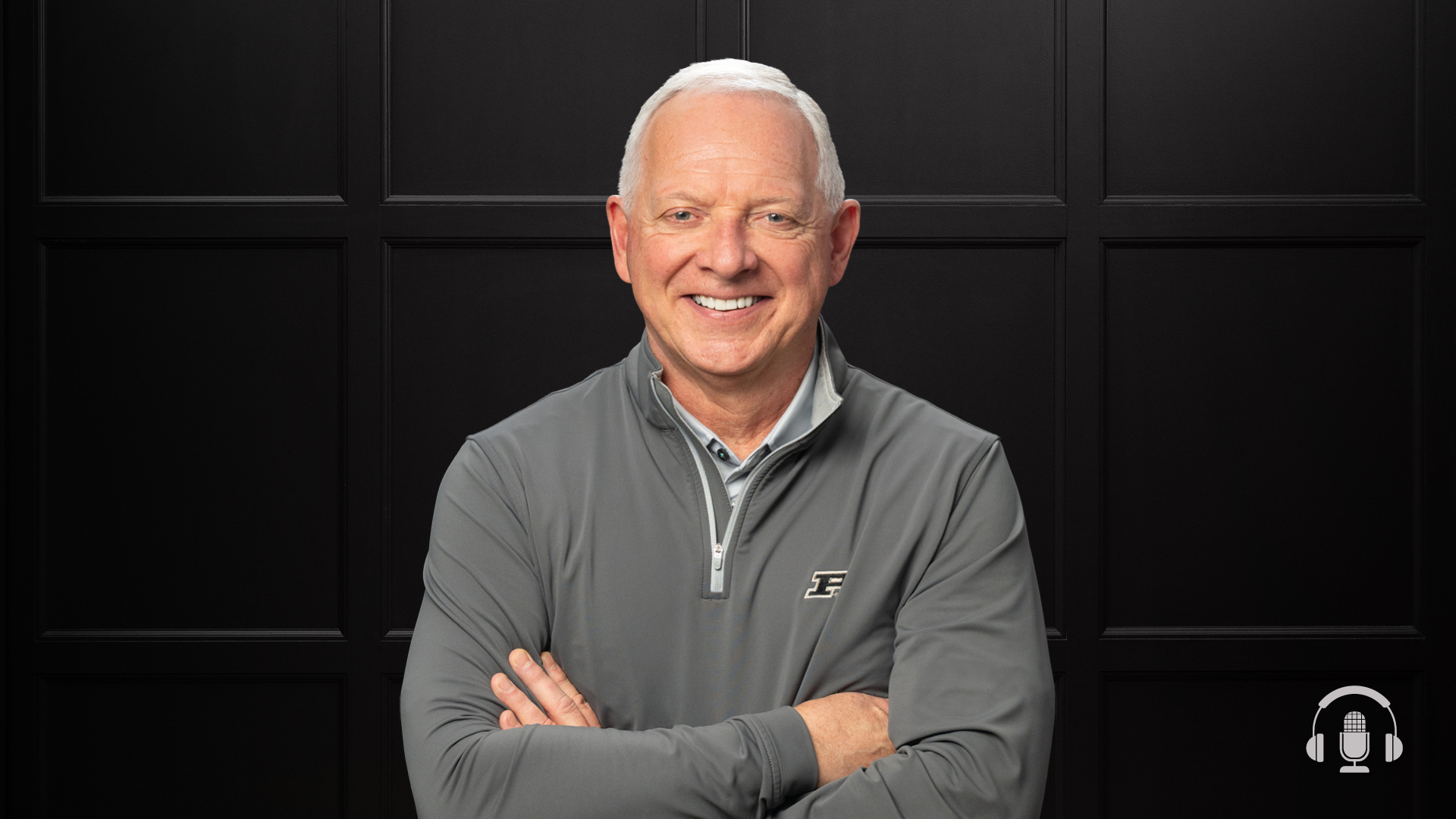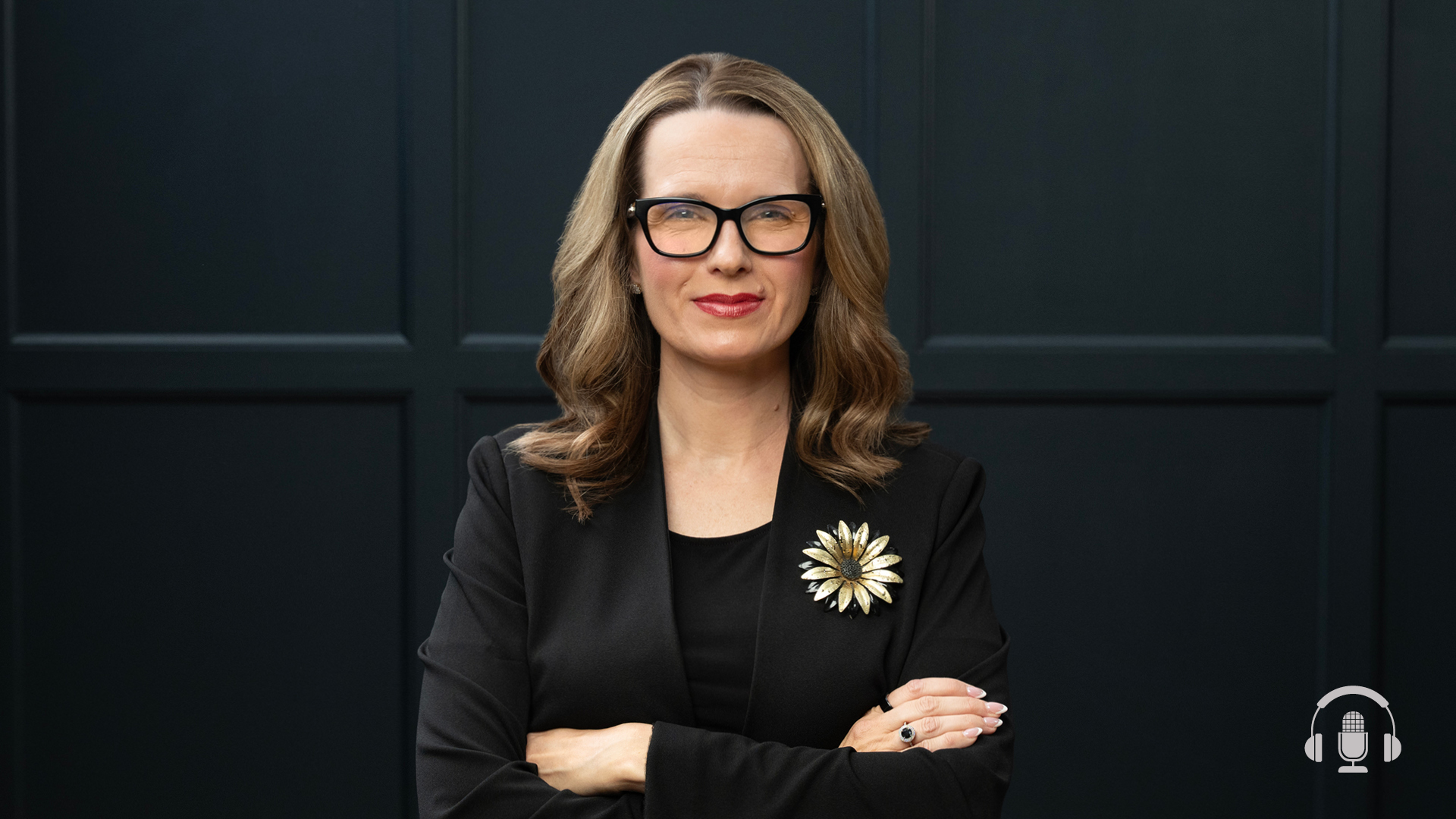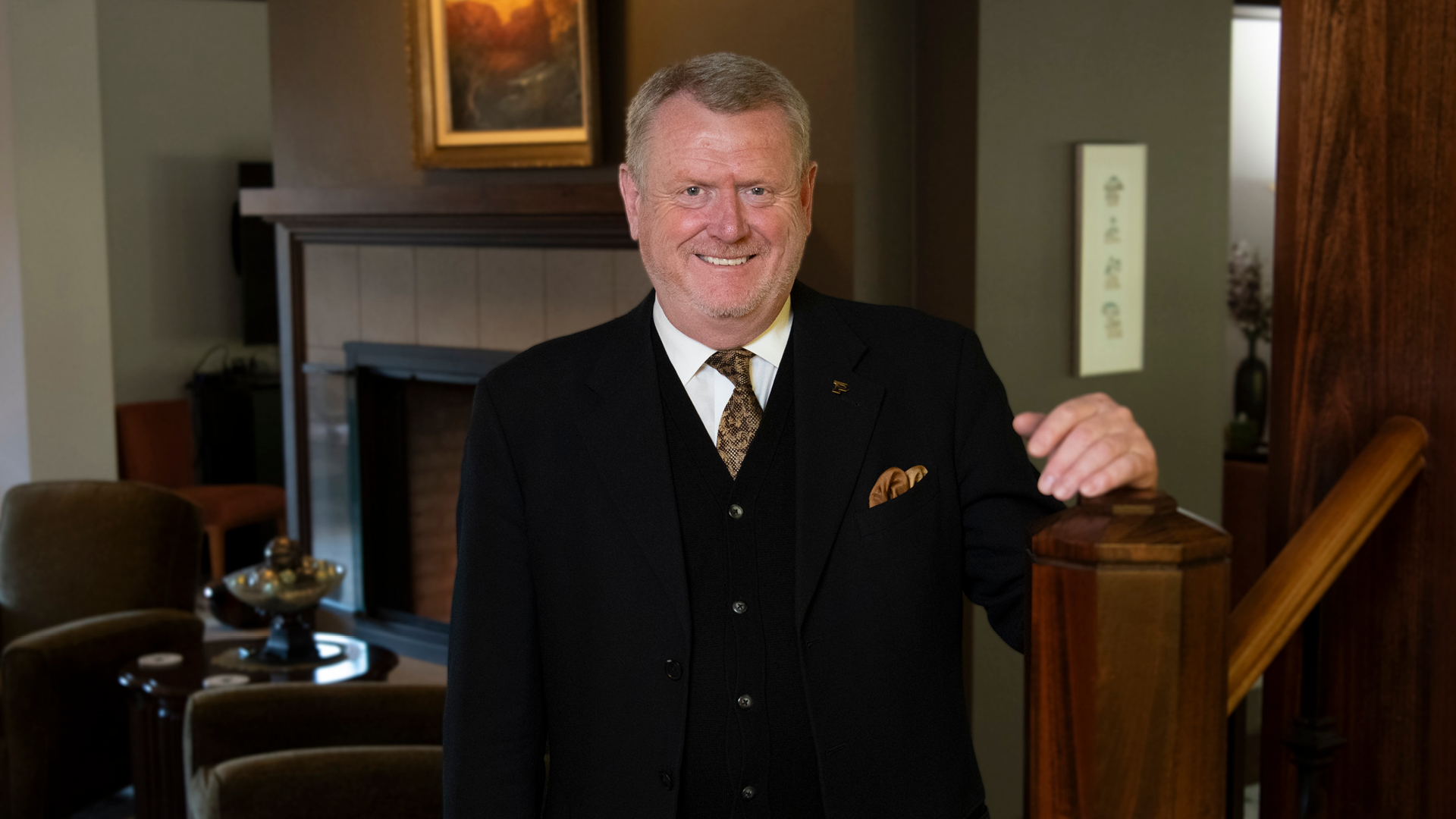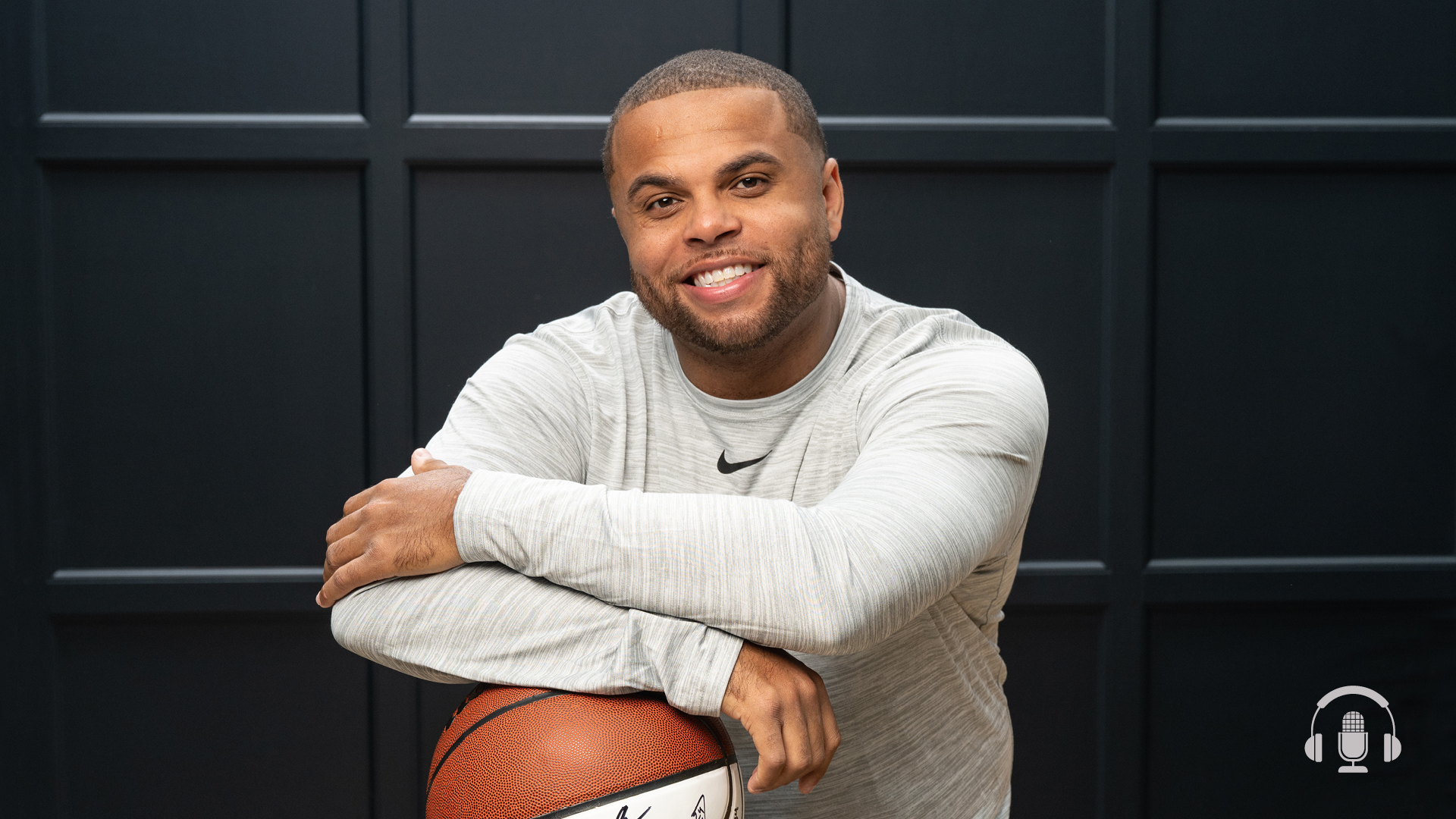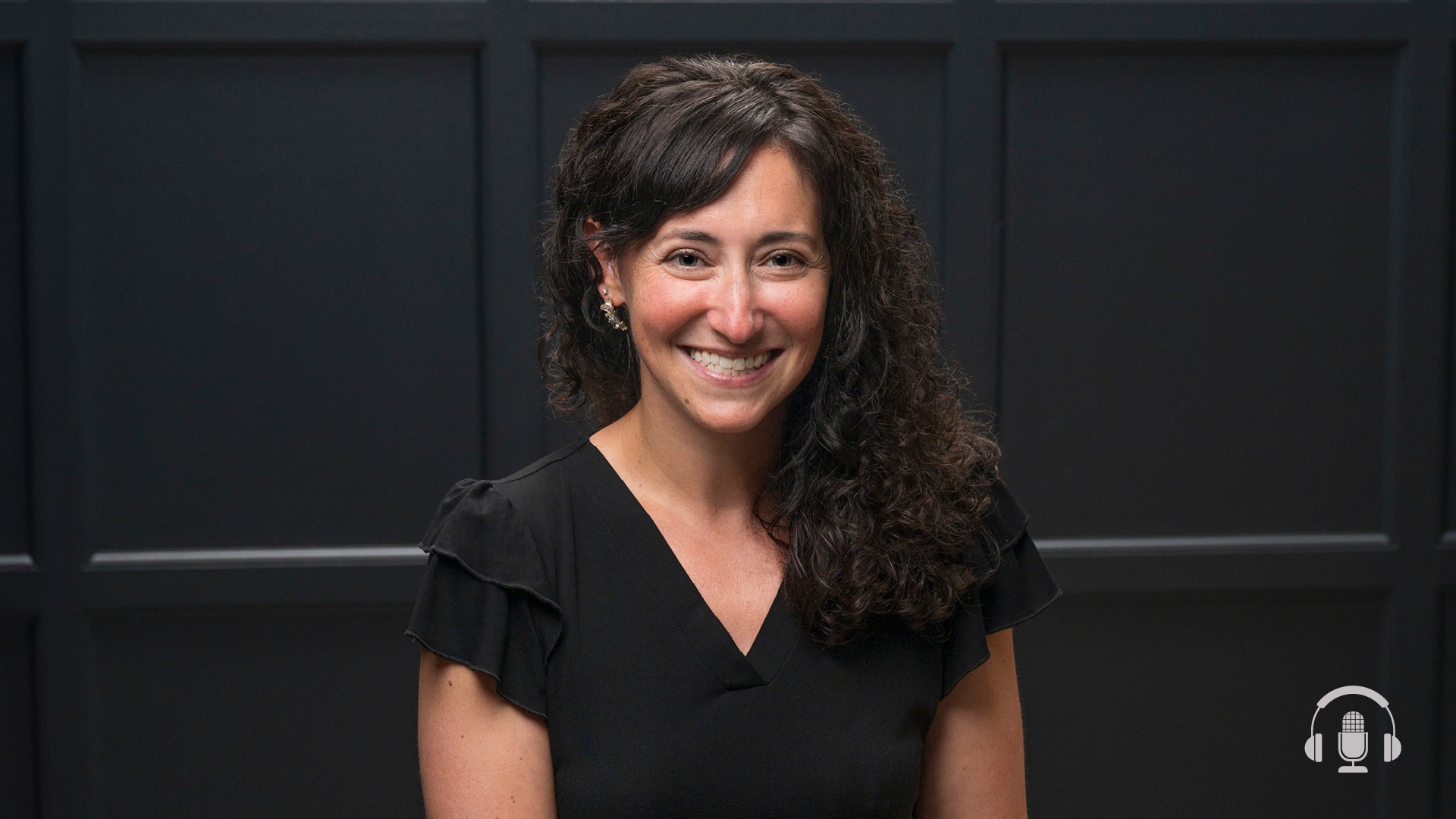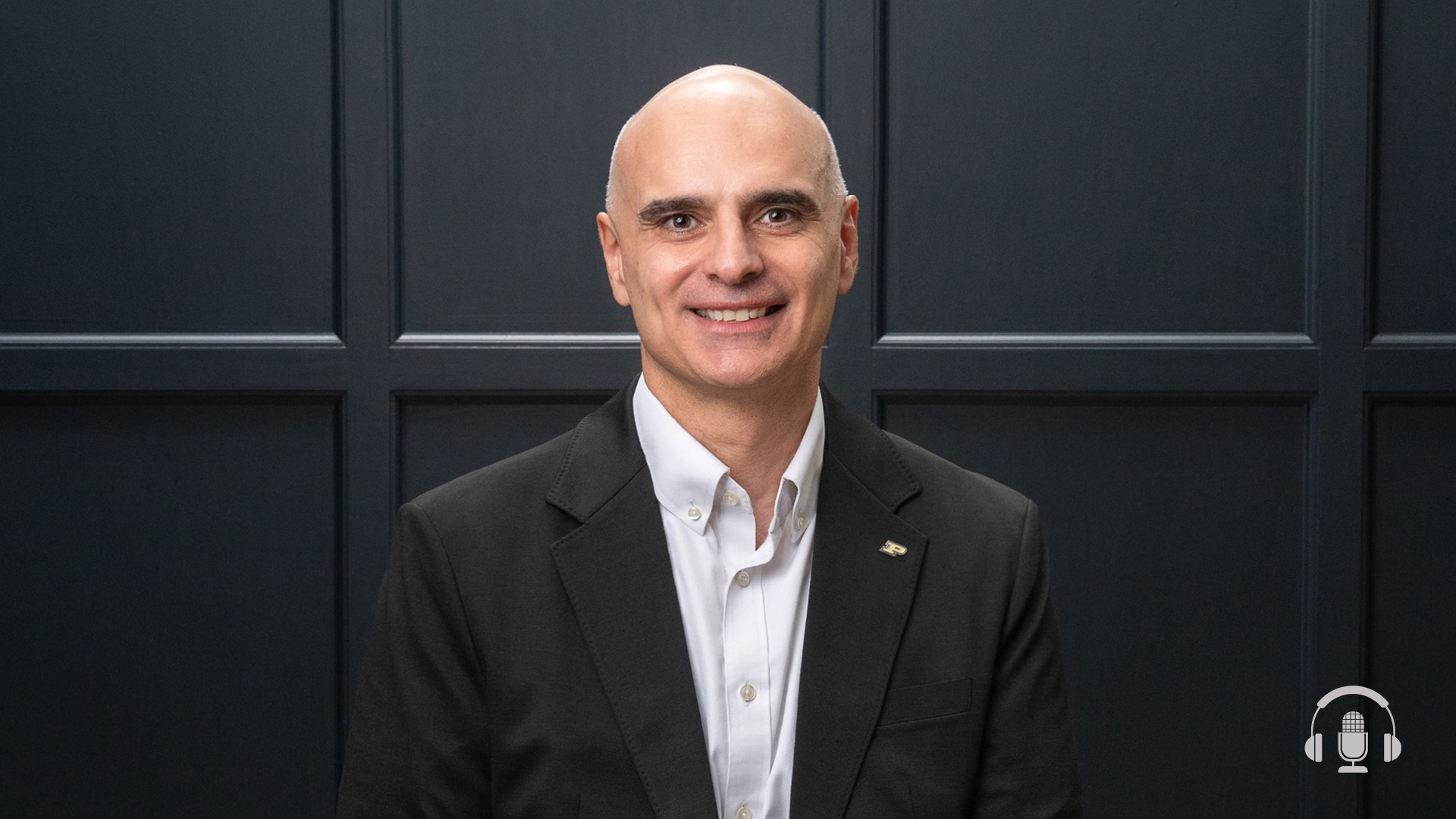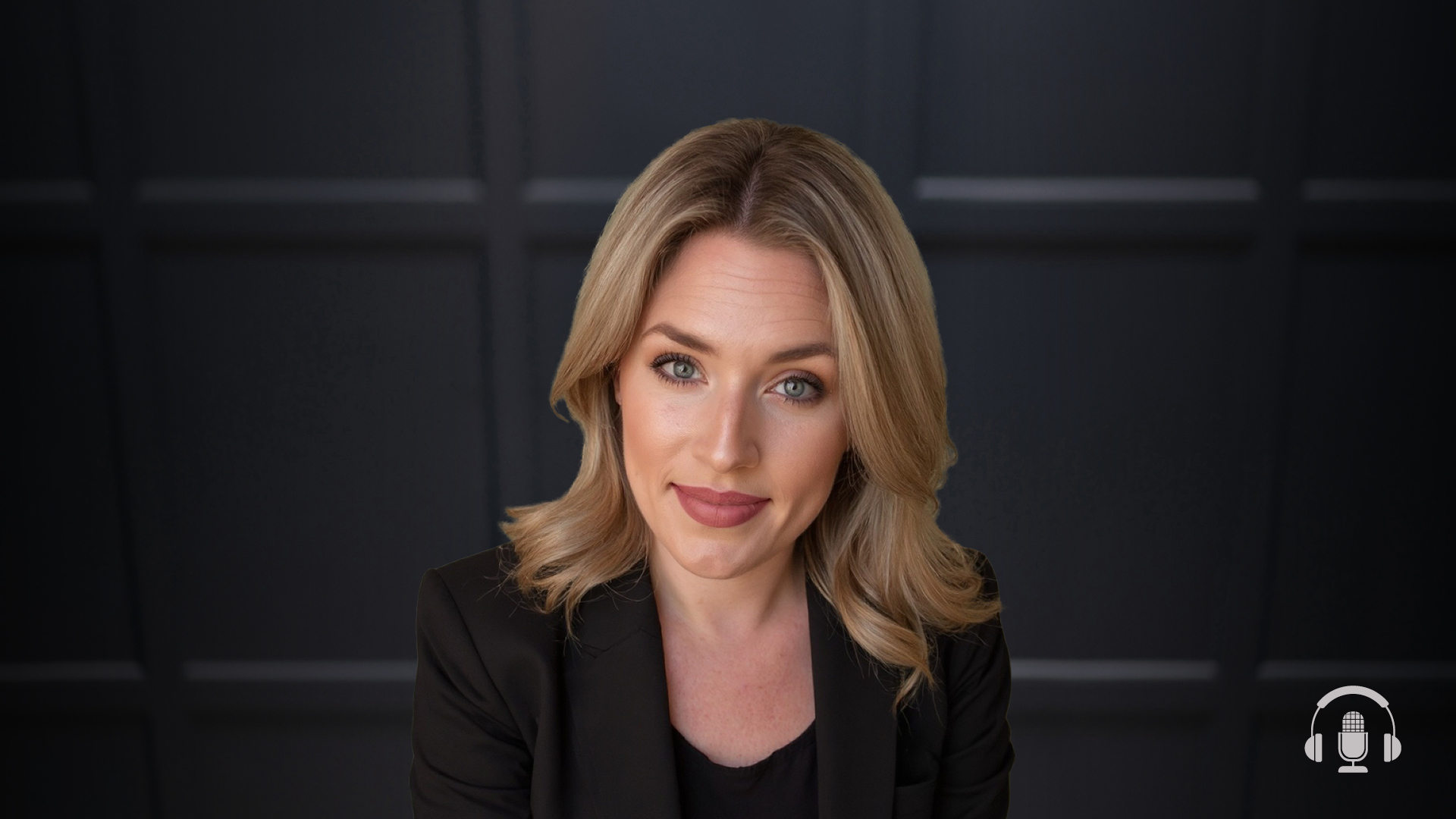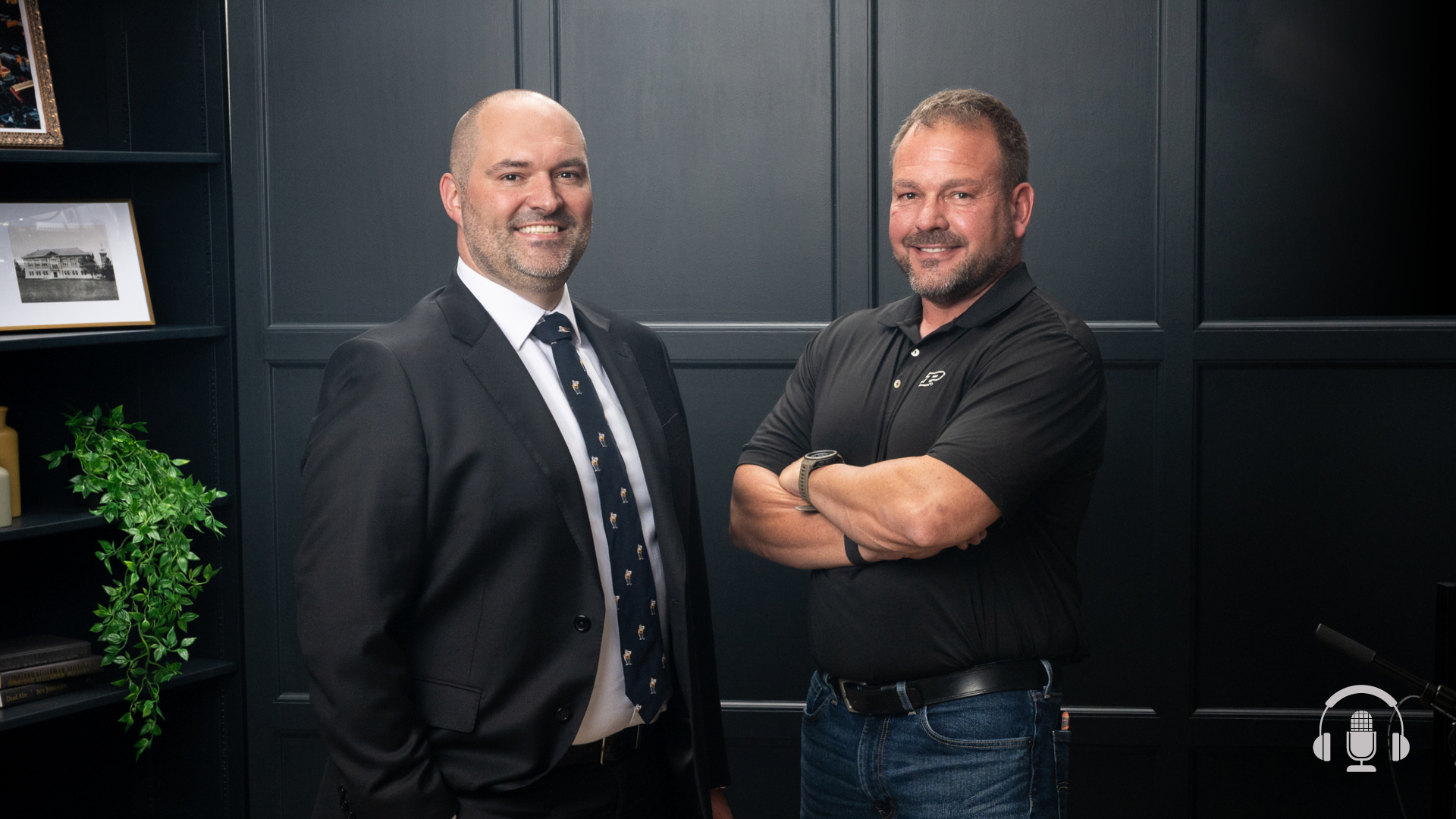Podcast Ep. 132: What It Takes To Run March Madness — and How Purdue Is Training the Next Sports Pros
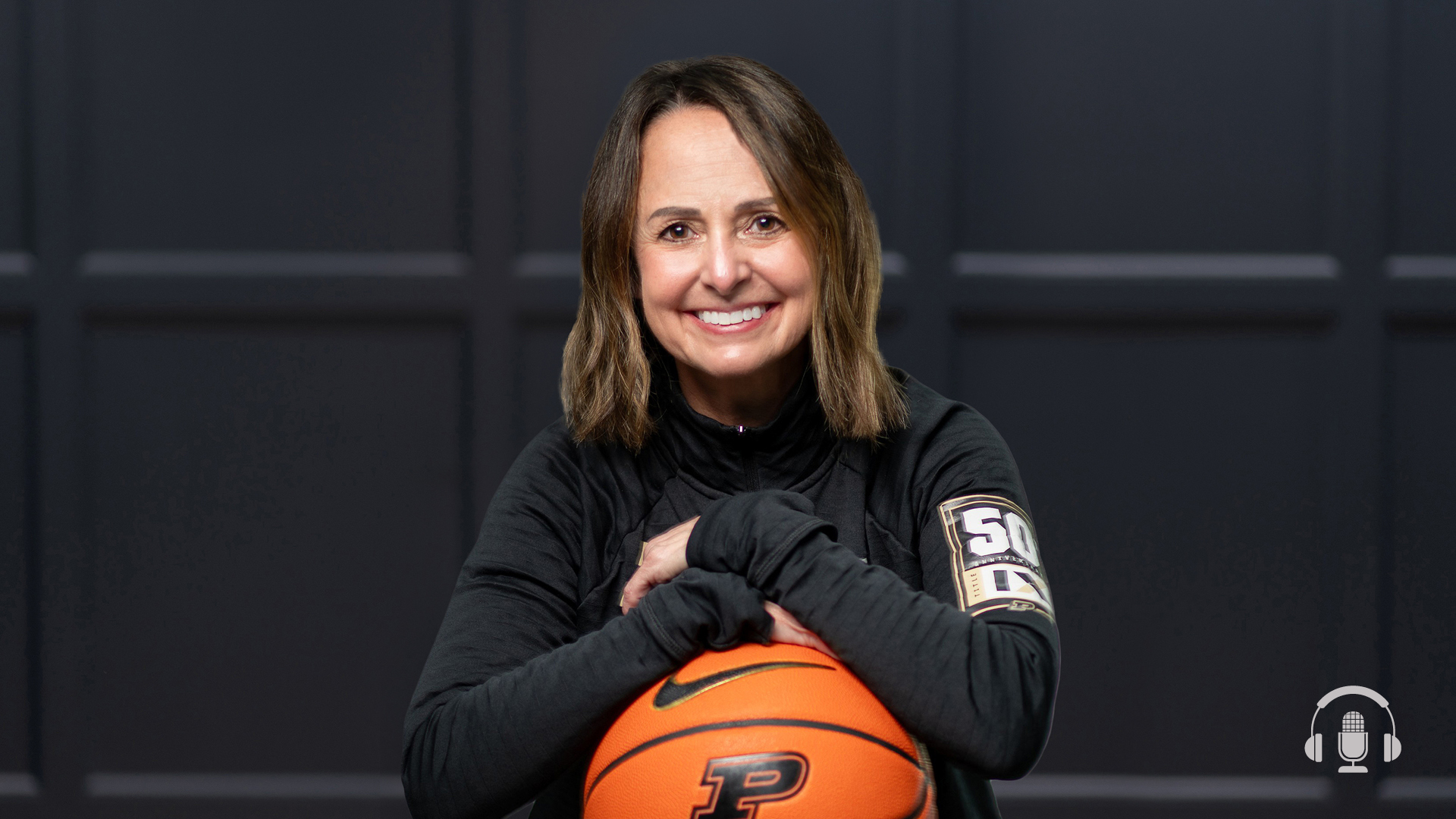
In this episode of “This Is Purdue,” we’re talking to Jeanne Boyd, executive director of sport management and senior advisor to the provost.
Jeanne is a leader in the sports industry. As the former managing director of the NCAA Division I men’s basketball tournament, she leverages her unique experience and insights to pioneer Purdue University’s exciting new master’s program in sport management.
In this episode you will:
- Learn more about the role this industry expert plays in an exciting new interdisciplinary master’s program in sport management, which has offerings in both West Lafayette and Indianapolis
- Hear what Jeanne has to say about the wide variety of careers available to graduates of this program like sports marketing, venue management, AI and technology in sport — not to mention all the hands-on learning opportunities with Purdue Athletics, Indiana Sports Corp and others
- Find out the range of disciplines, from communications to technology to education, that students can specialize in
- Discover what makes Indianapolis such a unique ecosystem and the perfect host for large sporting events — and why that’s great for students
- Go behind the scenes of the NCAA tournament and March Madness as Jeanne discusses her previous role and everything it takes to put on one of the largest collegiate sporting events of the year
Don’t miss this episode that dives into our new sport management program and what it takes to succeed in the sports industry.
- Learn more about Purdue’s master’s degree in sport management
- Learn more about the College of Health and Human Sciences
- Learn more about Jeanne Boyd
- Learn more about Purdue University in Indianapolis
Podcast Transcript
Jeanne Boyd:
This is Jeanne Boyd, and you’re listening to This is Purdue.
Kate Young:
Hi, I’m Kate Young, and you are listening to This is Purdue, the official podcast for Purdue University. As a Purdue alum and Indiana native, I know firsthand about the family of students and professors who are in it together, persistently pursuing and relentlessly rethinking who are the next game changers, difference makers, ceiling breakers, innovators, who are these Boilermakers. Join me as we feature students, faculty, and alumni, taking small steps toward their giant leaps and inspiring others to do the same.
Jeanne Boyd:
Sports don’t happen in a vacuum. And even some of the events that surround sports, it is so interdisciplinary. One of the pieces that’s going to set us apart is the fact that we’re going to rely on industry experts to help us build that curriculum. We’re going to stay not just on trend but ahead of the trend.
Kate Young:
In this episode of This is Purdue, we are talking to Jeanne Boyd, Executive Director of Sport Management and Senior Advisor to the Provost at Purdue University. Jeanne is leading Purdue’s new master’s degree program in sport management, an interdisciplinary program with courses taught at both the West Lafayette and Indianapolis locations. That includes hands-on opportunities with Purdue Athletics, Indiana Sports Corp, and other industry leaders. The program starts this fall of 2025 and will be housed in the College of Health and Human Sciences with offerings led by the College of Science and Department of Computer Science. Jeanne discusses the wide variety of careers students can pursue in the sports industry from sport marketing, sport analytics, organizational leadership, ticketing, sales, sponsorships, and venue management, plus sport analytics and AI in technology and sport. This new program reflects Purdue’s commitment to meeting workforce demands and preparing students for future career success in a dynamic and evolving industry.
Jeanne is also a veteran with national respect in the sports industry. She previously spent over a decade as the managing director of the Division I Men’s Basketball Championship at the NCAA. It’s safe to say she knows a thing or two about March Madness and the behind-the-scenes work it takes to put on a massive event like that. We’re diving into all of this and more in today’s episode. Here’s my conversation with Jeanne.
Jeanne, thank you so much for joining us on This is Purdue. We’re delighted to have you and talk to you today.
Jeanne Boyd:
Hey, thank you so much for inviting me. This is really special. I’m excited.
Kate Young:
We’re excited to have you. You are the executive director of Purdue’s new master’s program in sport management. This is taught at both West Lafayette campuses and Indianapolis campuses, and there’s so many hands-on things that you’re going to tell us about with the program. We’re partnered with Purdue Athletics, Indiana Sports Corporation, other sports industry leaders. We’re excited to jump into that, jump into your personal journey in the sports world, but first things first.
How did you come to Purdue? And tell us a little bit about your role here.
Jeanne Boyd:
I was so fortunate to be able to work at a high level of college athletics. The highest level, actually. From undergrad, I was at a very large SEC institution, and then I went to another SEC institution, which was large, then a conference office which was also Division I, and then the national office. And at some point in time, though, you start thinking about your position in life. How do you give back? When do you give back? And the responsibility to give back. And I felt that this was a perfect opportunity to do that.
That, plus you take into consideration just the academic success that is unmatched here at Purdue. The fact that you have an athletic department which is unbelievably successful. You have a brand that is nationally and internationally recognized, and also our Purdue and Indianapolis campus. It just felt like all the stars were aligned, and it was going to be a perfect opportunity for me.
Kate Young:
What are you most excited about for this role?
Jeanne Boyd:
I’m surprised by how excited I am. I’m really excited about the interdisciplinary collaboration. Sports don’t happen in a vacuum. And even some of the events that surround sports, it is so interdisciplinary. I was thinking as I was preparing for today that, if you gave me a specific discipline or major at Purdue, I could make a tie to every single one. It doesn’t matter what it is. Veterinary science. Bomb dogs. Agricultural, where you had your turf management.
Kate Young:
Absolutely.
Jeanne Boyd:
Yes-
Kate Young:
The Cubs.
Jeanne Boyd:
Yes. Amazing. It is just such an interdisciplinary effort. I think that that’s what makes it special.
Kate Young:
And I know we’ll get into this, but a lot of people, I think, talk about the glitz and glamour of sports, and there’s so many behind-the-scenes roles that are so important and are new and that didn’t exist 10 years ago probably.
Jeanne Boyd:
That’s very true.
Kate Young:
We’ll dive into that. Sports is such a fast-growing industry. It generates billions of dollars in Indiana, and it’s expected to grow 11% nationwide by 2033.
What should students be excited about with this new master’s degree program?
Jeanne Boyd:
We’ve worked with industry experts to help us build this. And at the end of the day, we think we’ve built something that is innovative. It’s forward-thinking. It addresses the fact that sport, not just college sport but sport across the board, is ever-changing. I don’t know if this is because I’m getting older, but it feels like time is going by quicker, but it is in a perpetual state of change. It addresses that.
It’s a 36-hour residential program. And courses, as you mentioned, will be taught in both West Lafayette and down in Indianapolis. And one of the things that I think is going to set us apart is, once students are accepted into the program, we’re going to sit down with them and conduct an in-depth interview to find out their area of specialty or interest or, again, just area of, again, almost specialization.
Every student’s going to have to complete six courses of foundational knowledge, and those are all housed in HHS. And those include things like sport management and sport business, business law, business communication, things of that nature that, regardless of what area of specialization you go into, there’s an application that’s there.
But then after that, every student’s roadmap is customized to their area of interest. And we’ll get to the point that maybe somebody doesn’t know which way they’re going to go, and that’s okay. But if they do know their way to go, they have four additional courses that they have to take that are electives outside of the department that will be tailored again to their specific area of interest. And then they have 450 hours of hands-on work where we’ve partnered with industry partners and university departments here to also match those areas of interest.
For example, if somebody comes in, and in their interview they say, “Hey, I would love to be a sport information director,” they’d have to take those six courses that, again, apply to everybody. But then those four courses … They might take something like public relations, public speaking, that I did not take that I would wish at this moment that I would’ve taken. Communications. And then maybe a data analytics and sport class and an AI and technology and sport class. And then those 450 hours will also be targeted in the sport information world. And again, we’ll work with our industry partners to make those opportunities available.
Kate Young:
It sounds like you’re zeroing in on what they’re passionate about, but then if they don’t know, there are paths for those people who don’t know either. Right?
Jeanne Boyd:
Right. And you know what? If you come in as a generalist, and you have no idea which direction you want to go, we’ll be able to just start them off somewhere, wherever they might think they have an inkling. And you know what? If that doesn’t work, that’s okay because I think you learn oftentimes just as much about what you don’t like or where you don’t want to go. And it’s not necessarily meaning that it’s a negative experience, but you can say, “Hey, I’m not really … I don’t love kids. I don’t want to be around kids. I do not want to be a high school teacher,” whatever it may be. But you learn just as much from that, so we will redirect that. Yes.
Kate Young:
Downtown Indy is such a special place. It’s the amateur sports capital of the world. We have the WNBA All-Star Game coming up this summer. We have the 2026 NCAA Final Four in Indy again. It’s home to the Colts, the Fever, the Pacers.
Why should students be excited about leveraging Indy and their position in the sports industry when it comes to this degree?
Jeanne Boyd:
Indianapolis has created such a special opportunity and almost an ecosystem that doesn’t exist anywhere else. There’s a lot of different components to this. The first component is, well, what makes them set themselves apart? The first thing is, going back in history, in 1979 … Was anybody even alive in 1979 in this room?
Kate Young:
Two?
Jeanne Boyd:
Two. Three? They created the first sport commission in the United States. Since then, it’s been setting the tone of, how did these large cities, usually, attract and also host these large-scale events? They’ve really set the tone for every other city in the world. There’s this historical significance.
The second piece that sets Indianapolis apart is that they have world-class facilities. Everything is walkable, is the third piece. And they also have all these tremendous hotels and restaurants. The other piece is the fact that we have now a campus down there in Indianapolis. All those things together make for a perfect almost ecosystem. In a sense, I think of it as, if you wanted to be in film, it doesn’t matter if you’re an actor, a director, a producer, or if you’re a camera person or in special effects. You’re going to Hollywood. Right?
Kate Young:
Going to LA.
Jeanne Boyd:
That’s exactly right. To back up, the other thing that Indianapolis has is just an unmatched level of direction or leadership. Patrick Talty there at the Sports Corp, he understands kind of the broader picture and all of the things that are needed to host and support these events. Again, they’ve got almost, again, a broader sense of the economic impact and the infrastructure and things that are needed and the lasting effects that hosting these types of event brings with it.
Anyway, if you are … Again, it doesn’t matter what your area of specialization is. If you want to be in film, you’re going to Hollywood, and that’s what they’re creating in Indianapolis. If you want to be in sports, Indianapolis is the place to be.
Kate Young:
I’ll never forget … I’m from Fort Wayne. Smaller than Indy. And I went to my first NCAA Final Four. Maybe it was in 2010.
Jeanne Boyd:
Yes. Yes. Butler’s run. Butler’s run. Loved it.
Kate Young:
And it was just this whole the vibes of the city and how hospitable Hoosiers are, right?
Jeanne Boyd:
Yes.
Kate Young:
There were so many pieces and parts that I was just so proud to now be living in Indy and be a part of that. It’s such a special place.
Jeanne Boyd:
And you should be proud of it. I mean, again, in my previous role as the managing director of the Men’s Final Four, I had, again, the privilege to work across all cities that submitted bids. They were able to host the event. I remember as a part of the post-tournament evaluation that we conduct with all the Final Four teams plus the host city to basically say, “Hey, what can we approve upon? How can we do things better? What issues came up that were not detailed in our directions or bid specifications?” And I talked to the person who ran all the volunteer stuff, and I said, “Coming into this again, what set them apart?” And it was very clear that it’s this really nice balance of knowledgeable staff. They’ve hosted all of these events, and they do it really, really well. Mixed with an interest in almost an evolution or an evolvement of the event. As events continue to grow and whatnot, they’re open to all of those things, but also preserving the Hoosier hospitality just made such a special combination.
When I worked for the Final Four, I was also the main point of contact for the NABC, which is the National Association of Basketball Coaches, and they host their yearly convention in conjunction with the Final Four. You had basketball coaches coming in from Divisions I, II, III, high school coaches from all over the country, and they have a board of directors that at the end of the Final Four, they submit these recommendations for future years, and they wanted the Final Four to … Can we set up an opportunity where it rotates between two specific cities? And one of those was Indianapolis. And I had to gently explain that there’s a little bit of taxing. It’s a heavy load. It’s a heavy load in a sense of personnel and volunteerism and all of those things, but there’s also a financial heavy load, so we do need to spread it around a little bit. But based on their experience only … Again, these are folks that are coming in from all around the country. They wanted to just narrow it down to two different cities, and Indianapolis being one of those.
Kate Young:
We know Indy is special. West Lafayette is also special. The program here on campus in West Lafayette will be housed right next to Purdue Athletics.
What does that mean for students?
Jeanne Boyd:
Oh, my gosh. Yes, we are in Lambert, which is connected through a tunnel right directly to Mackey. Those students who decide to come and experience the program from a West Lafayette perspective gives them the opportunity to get behind the scenes to, again, one of the most respected and successful athletic programs in the country.
Again, not only being connected physically, but we do have a great partnership with Purdue Athletics that will offer these students a behind-the-scenes look at a wide variety of opportunities or what are potential jobs. I don’t think people understand the depth and breadth of the different opportunities that are available. In my mind, if you think about sport management, you might think about coaching or essentially managing, whatever that may be, but I would encourage folks to take a minute and look at our team link that’s there on Purdue Athletics website to see the depth and breadth of opportunities because it is crazy, but it’ll give them a behind-the-scenes look at what opportunities are available.
Also, an opportunity to be connected with those professionals because they’ll be guest speakers in our classroom. They’ll serve on a board that’s helping us continuously look at the curriculum and make sure that it is evolving and keeps up with trends and things of that nature. It’s going to be fun.
Kate Young:
With things like the NIL in the news everywhere now, this increased regulation at the professional level of sports, how will this degree program at Purdue support this need for flexibility in an industry that’s always changing?
Jeanne Boyd:
You’re exactly right. It is changing every day. I feel for the commissioners and the athletic directors and the NCAA and all of those that are involved from an administrative perspective, that it’s changing constantly, and it’s almost like they’re whipping in the wind.
I think one of the pieces that’s going to set us apart is the fact that we’re going to rely on industry experts to help us build that curriculum. We’re going to stay not just on trend but ahead of the trend. Not only will they be involved from an advisory perspective, but they’re also going to serve as, in some cases, adjunct professors. Guest speakers. They’ll also serve as mentors and more of those types of tangential touch points with our students. They’ll oversee kind of …
Again, we talked about the hands-on experience and the 450 hours that they have to complete. They’re also providing those opportunities. They’ll give feedback on job performance and what’s needed. Because actually right now there’s a lot of conversation about there being a little bit of a disconnect between when folks come out of graduation versus what the industry needs. These folks, again, being so well-connected with them and being essentially friends, they’re going to allow us and provide feedback to help us bridge that gap or close that gap.
Kate Young:
Before coming to Purdue, we touched on this a little bit, but you spent over a decade leading operations as the managing director of the NCAA Division I Men’s Basketball Tournament. I’m sure a lot of our listeners are excited to hear some more behind-the-scenes-
Jeanne Boyd:
Oh, boy.
Kate Young:
… details of that job and what that entails. Tell us about your path to the NCAA and what led you on that journey and through that role.
Jeanne Boyd:
Looking back to undergrad … And I think a lot of your guests that have come on the podcast have said that their journey wasn’t linear. That’s certainly the case for me. I started out as an accounting major. Well, I love numbers, I love money, but that did not work for me. I was like, “This is so boring.” Then I shifted to being a business major. That didn’t work either. And then I was in education. And again, as looking back, that didn’t seem linear at the time, and I felt like I was kind of in this weird place, and my parents certainly didn’t think it was very logical at the time.
But looking back, sport management has elements of all of those things. You’re preparing budgets. You’re doing organizational leadership, learning how to communicate with folks. There’s an educational component in a sense that, with a local organizing committee, you had all of these meetings where you would educate them on what’s needed and what we need. Here are all the logistics of it. It’s just so multifaceted and so multidisciplinary.
Up until the day my dad passed away, every time I called, and I had been directing the Men’s Final Four for eight years, he would say, “Don’t tell me. You called me to say you changed your major.” I was like, “Dad, I have a PhD.”
Kate Young:
We’re too far down now.
Jeanne Boyd:
Right. Right. Again, it wasn’t linear. It wasn’t logical. But looking back, just because, at that point in time … Again, I’m older than everybody in this room. That opportunity wasn’t available, but it’s so multidisciplinary.
Kate Young:
I can’t imagine the logistics and coordination that it takes to put on an event that big.
Jeanne Boyd:
It’s crazy. It is absolutely crazy.
Kate Young:
Tell us some insider info. Some behind-the-scenes stories. What’s something that’s really memorable from your time in that role?
Jeanne Boyd:
The memories for me … There are a couple of special ones. You mentioned the Butler run in 2010 was memorable only because when you work at either a conference office or the NCAA, you’re coached, and it’s the expectation that you’re neutral. You want everyone to have the same experience. You don’t have any type of emotional investment on who wins and who moves on through the bracket.
To me, it was, again, take the names off. It was really boring to have the same four teams there every single year. I always loved when somebody kind of-
Kate Young:
The underdog?
Jeanne Boyd:
Yes. Yes, absolutely loved that. Absolutely loved it.
Kate Young:
The Cinderella story.
Jeanne Boyd:
Yes, yes, yes. That was really fun. But my most memorable moments of working in that for over a decade wasn’t really a individual moment or an event, but it was more so the relationships that were built behind the scenes.
Every year, we had 13 preliminary round sites, which in my mind, again, is kind of one unit of the Final Four. And then the Final Four itself is its whole other entity. It’s the same staff that works both of them, but they’re very, very different. Talking about the preliminary rounds, there’s a responsibility to have kind of a cross section of West Coast, the Middle America, East Coast to make sure that it covers all the different television zones and things like that. But there are a handful of tournament managers who are usually deputy athletic directors that we would come back year after year, and it would be the same … Not year after year, but a couple of times next times bids came open that ended up being my best friends in the business.
You’re in it at a pace that is unbelievable. You’re working, I would say, at least 70 hours a week.
Kate Young:
Absolutely.
Jeanne Boyd:
You’re in the trenches with these folks, and you just … You’re there with them for so many hours a day, and you have no idea what it’s like coming down the pike, what issues you’re going to hit, and through all of that, you’re essentially in the trenches with them.
There’s a handful of tournament managers across the country. There’s about six of us that established almost this clique. It’s almost like being in a high school, being new to a high school, and you don’t know what lunch table you’re going to sit at, and you end up finding your people, and this is the exact same situation. And you find your people by trust, by mutual respect, by accountability, availability, consistency in management. Those folks have ended up being some of my best friends.
And it was also special because we grew up together. We all started around the same age. Even though our professions have taken different twists and turns, we still have a text string together, and we make fun of each other and tease each other, but at the same time, we’re still supportive of each other. That’s what really has stuck with me and will stick with me for the rest of my life, is the friendships and the connections.
Kate Young:
We were talking earlier this week. I think something that people might not necessarily think of is how secretive and basically locked down you had to be in your role when you talked about a police officer was guarding the door. Tell us a little bit about the process of choosing cities. Choosing the team’s selections. I know our listeners and viewers will be super interested in those little behind-the-scenes stories.
Jeanne Boyd:
There are two separate processes. The whole site selection thing is important because, again, you should … In a perfect world, you’ll be able to balance an East Coast site and a West Coast site. And not dating myself, but back when I was doing it, there were only seven cities that could host the event, meaning that they would have the facility requirements that were needed. They had the hotel and essentially the infrastructure that was required. We developed this big bid specification notebook that was probably 200 pages long that talked about everything from the broad brushstrokes of what’s required down to the height and the width and the depth of the tables and the candlelight strength in the competition venue. It was just ad nauseam detail.
Versus the selection seating and bracketing thing is something that’s completely separate. That happens right before selection Sunday. That’s about a week-long event. You’re in lockdown where they would set aside … There was a specific hotel down in Indianapolis that we would go to that no one was allowed to visit the floor. We bought out the entire floor. There was a guard who was an Indiana state police officer, who was absolutely wonderful, who was positioned right there at the elevator bank. He had a list of every single person plus their headshot, so he knew who was supposed to be on the floor. And anyone else who would try to get off that floor, obviously he wouldn’t let them. But when I first started, I remember helicopters flying, circling the facility. There were no deliveries that would be accepted.
Kate Young:
No lunch deliveries.
Jeanne Boyd:
No deliveries.
Kate Young:
Delivery driver could overhear something.
Jeanne Boyd:
That’s right. Well, and it was a lot of institutions who might be considered right there on the bubble would send pages. And again, I’m dating myself. It would send pages and pages of information to basically bolster their position as to why they should be-
Kate Young:
“This is why we deserve to be in the-
Jeanne Boyd:
Yes. We closed down every phone line, so you couldn’t call our individual rooms. It was absolutely crazy, but it is a real protective environment, free as possible of any type of bias. Perception is reality in a sense that, if there were teams that were involved in the discussion … I remember one year we had Mike Slive, who was the commissioner of the SEC Southeastern Conference. And anytime an SEC team was discussed, he would have to leave the room. And if I remember correctly, there were a handful, five, six, seven institutions that were in the SEC that were up for discussion. And so, he would have to leave the room. He was out of the selection room just as much as he was in there.
But again, just to be able to look everyone in the face and say, “Hey, look, this is completely free of bias.” He wasn’t even in the room. He didn’t submit a vote. It was an independent decision. A collective decision. I think that that gave it a little bit of credence.
Kate Young:
Absolutely. That’s fascinating.
We talked about you changed your major several times, it sounds, but what was that turning point for you that you were like, “I really want to pursue sports as a career,”?
Did you grow up just loving sports? Walk us through that.
Jeanne Boyd:
I grew up in a family. I’m one of five children. I’m a four of five. The best, number four of five. I have three brothers and a sister. And our household was incredibly competitive. Hyper-competitive. Unhealthily. Unhealthy competitive. We would compete at every level. I remember my first memories again are probably field day in elementary school, and I may or may not still have the 50-yard dash record at the elementary school.
Kate Young:
Let’s do a fact check on that-
Jeanne Boyd:
Yes, please.
Jeanne Boyd:
Heights Elementary. Spring, Texas.
But all of my brothers competed, and my sister competed, and just this unhealthy hyper-competitive. It wasn’t even really about sports at the time. It was who could unload the dishwasher the fastest. Who had read the most books over the summer months?
Kate Young:
Your parents are smart.
Jeanne Boyd:
Oh, my gosh. Yes. My dad was an engineer and military, so it was a no-nonsense type of household. And again, every day, life is about competition. And then mom was a nurse.
My earliest memories revolve around, again, playing football in the backyard or the elementary school field day. But one memory that stands out to me that is kind of full circle is we have to picture it. It is Spring, Texas 1983-ish. I was playing seventh grade basketball, and we were on our way to a tournament. I remember it like it was yesterday. It was a double-elimination tournament. And we’re about to pull out of the parking lot, and our coach comes down the little skinny aisle, and she’s handing us copies of the bracket. She hands one to me. By the way, I had the pigtails. I had the tube socks pulled up high. I was wearing the blue-and-gold polyester, scratchy uniform. She hands out the bracket, and we’re at a number seven or whatever seed, and I thought, how did we arrive at this number seven? Who designed this? How did it come about? Why are we seven when we’ve already played against number one and number four, and we’ve beaten both of them?
And so I was just fascinated by the inner workings of not only the bracketing piece, if we win, we go here. If we lose, we go here, but also just the behind-the-scenes operational detail of it. Who is calling to make sure we have referees? Who’s calling to make sure we have an official score? Does that even matter in seventh grade basketball? I don’t know. But again, it just became a very full-circle moment that I remembered.
And also with it being a double-elimination tournament, it’s a little bit confusing. If you win, you go here. And I remember trying to gently … She said, “If we win, we play this time. If we lose, we play it this time.” And I remember going, “No, no, no, no. If we lose, we actually go over here.” Again, I’ve just been fascinated. Again, maybe it’s genetic with dad being the engineer and military, but I’ve always been fascinated with the behind-the-scenes work.
Kate Young:
And then fast-forward, and you’re literally just deciding-
Jeanne Boyd:
Yes. Yes.
Kate Young:
… where people go.
Jeanne Boyd:
Yes, yes, and the bracket, actually, would come off of my computer. I facilitated the selection seating and bracketing process. Gosh, and that’s a whole ‘nother level of-
Kate Young:
Secrecy?
Jeanne Boyd:
… secrecy and pressure. The committees are … At that time, again, it was a 10-member committee, and they were usually athletic directors or conference commissioners, but there’s a requirement to make sure that there’s a balance of representation from East Coast to Central, all the different time zones, plus the level. They all had to be Division I. But the different sizes of institutions. There had to be a cross-section of representation.
Again, the fascinating thing was they served four-year terms, but they would rotate off every four years. The addition or subtraction of one person was just kind of this fascinating case study because it would change the whole dynamics in the room. But it was really fun to … Again, you’re in the trenches with them. You’re talking about teams for 12 hours, at least, a day.
And there were some instances when I was like, “For the love of the Lord, can someone just please vote? Let’s just call for a vote. We’d had enough discussion.” It was really fun. And again, you’re in the trenches with them, so you develop these relationships. And some of them would feel the pressure during the selection piece, whether or not the team is in or out. Others would feel the highest point of pressure being where their seed was. Isn’t that interesting? In my mind, for me, it’d be whether they’re in or out. After that, it’s up to them, right?
Kate Young:
Sure. Sure.
Jeanne Boyd:
But, well, every-
Kate Young:
It’s all the dominoes and how they fall into place depending on the seed, right?
Jeanne Boyd:
Yes.
Kate Young:
I can kind of see that side of it, too, I guess. Women are increasingly stepping into leadership roles in the sports industry. People in general are getting more excited about women’s sports. You think about Caitlin Clark coming to Indy with the Fever. Our own Boilermaker, Stephanie White, is now the Fever head coach.
What will that mean for the future of the industry to have more female voices?
Jeanne Boyd:
When I walked into that room for selection, and again, I was facilitating the process, so I would lead them and say, “Hey, this is what you’re doing,” I never once gave a thought to, my goodness, I’m the only woman in this room.
Kate Young:
Interesting.
Jeanne Boyd:
I never once thought about that, I think because I looked at him and thought, you don’t have anything on my brothers. They were so mean and brutal. They would say, “Hey, go run deep. Do a slant.” And so I’d go, and I’d run the little football pad, and they would never throw me the ball. On one hand, I wasn’t ever … I didn’t ever feel intimidated, but I knew I had to have my ducks in order.
And I was also very appreciative for all the women who came before me because, if not, this opportunity wouldn’t be afforded. We talked a little bit about Indianapolis. They also set the tone way back in 1979 when they developed that first sport commission. They also identified a woman who was the first president of the Indiana Sports Corp, which, in 1979, that was unheard of. Again, I’m just so appreciative of all the women who came before.
There’s been a lot of conversation on your podcast about the implication and the effects and of everything from Amelia Earhart who was ahead of her time. I feel privileged to have been a part of the sport evolution where, when I first started, it was an exception. Now, it’s an expectation. And it’s not about really representation. It’s about women being put in positions of executive level. You think about Mel Raines, who’s down there, who is a CEO of Pacers Sports & Entertainment, but I don’t think we do a really good enough job of celebrating that because Mel is amazing.
But there’s also Allison Melangton who was the head of the Super Bowl back in 2012. Again, we don’t hear her name enough. But under her leadership, we set what which is widely known as being the most successful Super Bowl in recent history. You have people like Julie Rowe who is the commissioner of the Horizon League, which is down in Indianapolis, and she’s the first woman to chair the Indy Sports Corp. You have Susan Baughman ran the college football playoff in 2022. Every single Final Four in recent memory for me. She’s also overseeing or directing the NBA All-Star Game. The WNBA All-Star Game.
These are women who … Again, it’s not about representation. It’s about them being in positions where they are, again, executive directors and just making a real impact.
Kate Young:
What advice do you give to young women when it comes to pursuing a degree in the sports industry?
Jeanne Boyd:
I would tell them to be prepared to work your butt off. And that’s not any different for women versus men, but it is so competitive. Life is competitive, again, as I mentioned, but it is about setting yourself apart from these other 300 applicants. That I would tell them to be passionate about it. Be a really, really good team player because that’s a whole ‘nother part of it. And be curious. Don’t be afraid to ask questions. And also surround yourself with people like you. It’s about finding your people.
Kate Young:
Just like you did.
Jeanne Boyd:
Yes, just like I did. And again, we talked about Susan Baughman, and we haven’t mentioned people like Joanne Briett who is on the board of trustees here. She is such a, again, fascinating case study. I keep telling her that she needs to run for office and that I would be her campaign manager. She doesn’t want to do that. She’s kind of giving me the thumbs down on it. That she’s so impactful. Been almost kind of behind the scenes, and that’s where she’s most comfortable. But also people like Dean Flesch. Lucy Flesch has her fingerprints all over the sport management program. Again, it’s not about representation. It’s about influence and creating the next generation of sport leaders.
Kate Young:
You talked about how you had to stay neutral for a long time. How does it feel to wear black and gold and truly be a Boilermaker and support Purdue?
Jeanne Boyd:
And mean it. It has been so special. You and I talked about this off camera, but being able to be here in West Lafayette and Purdue is really, really special. I really feel like I have made friends here that will be friends for the rest of my life.
Now, throughout my career, I’ve had an opportunity to work across a lot of different campuses, whether I worked at them, or they were part of the … When I was an associate commissioner, one of the member institutions, or Final Four, I’ve worked with several, several campuses. I also had, again, brothers and sisters who went to … At the time were Southwest converts or whatever, but they went to University of Texas and Texas A&M and the Naval. I’ve had exposure to a lot of different campuses.
Purdue is just something that is really special. I mean, it is a really unique blend of humility and almost understatement, but at the same time kicking ass. I mean, they are incredibly … And that is Joanne Briett, right? It is this understated excellence and this, again, just humility and friendship. I am so proud to be a part of the Purdue community and take that, I don’t want to say position, but opportunity very seriously.
The other thing that really is special about Purdue is that it is generationally deep. And again, it’s weirdly collegial in a sense that, when you’re in the SEC, you are not going to see University of Florida and University of Tennessee or Georgia fans tailgating together. That just doesn’t happen. Here, again, there’s a collegiality that you see them tailgating together. It’s almost a shared experience, but also the roots are generationally deep. I’ve never seen anything like it in my life. And I’ve talked to Mike Bobinski about it too. We’ve just never seen it. To have not only a sibling, but your mom and your grandmother and father, and your aunts and uncles, and everybody’s involved in Purdue, it is really something special. And again, it’s something that I so much love and appreciate and cherish.
Kate Young:
It’s nice to hear that from someone who’s had so many different experiences with so many different colleges show and tell us how special Purdue is. Well, Jeanne, we can’t thank you enough. It was such a pleasure. It was so fun learning more about you and your journey.
Jeanne Boyd:
Thank you so much for having me. If anybody’s interested in the program and willing to do the work, we have a place for ’em.
Kate Young:
And we’ll link some things in our show notes for easy access for our listeners.
Jeanne Boyd:
Great. Thank you so much.
Kate Young:
Thank you.
Jeanne Boyd:
Boiler up.
Kate Young:
We can’t thank Jeanne enough for joining us on This is Purdue. She is so delightful and genuine, and we’re proud to have her as part of our Boilermaker community. You can watch more videos with Jeanne, including some of her thoughts on why Purdue basketball is so unique and her time serving as her college mascot, on our podcast YouTube channel, youtube.com/@thisispurdue.
Time flies when you’re having fun, and this marks our last episode of our Spring 2025 season already. But we’ll be back in August for our Fall 2025 season, and we have so much more in store for you all. And don’t forget, we’ll have bonus content releasing on our YouTube channel all summer. Be sure to subscribe over there. Plus, be sure to follow This is Purdue on Apple Podcasts, Spotify, iHeartRadio, or wherever you get your podcasts so you don’t miss out on our kickoff to the fall season, which may include a certain athletics guest I’m sure all of our Boilermaker fans are curious to learn more about. We’ll talk to you in August.
This is Purdue is hosted and written by me, Kate Young. Our podcast videography for this episode was led by Ted Schellenberger in collaboration with John Garcia, Thad Boone, and Zach Mogensen. Our social media marketing is led by Maria Welch. Our podcast distribution strategy is led by Carly Eastman. Our podcast design is led by Cheryl Glotzbach. Our podcast photography is led by John Underwood. Our podcast team project manager is Rain Gu. Our podcast YouTube Promotions is managed by Megan Hoskins. Additional writing and research assistance is led by Sophie Ritz and Ashvini Malshe. And our creative production assistant is Dalani Young.
Thanks for listening to This is Purdue. For more information on this episode, visit our website at purdue.edu/podcast. From there, you can head over to your favorite podcast app to subscribe. And don’t forget, you can also check out all of our podcast content on our podcast YouTube page, youtube.com/@thisispurdue.
And as always, Boiler up.
